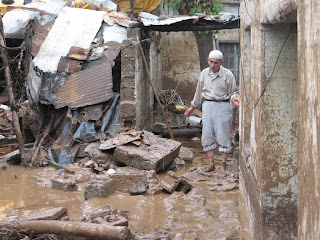The Consequences of Climate Change Will Be Significant, and Will Hit the Poor the Hardest
There is much data to support this claim. Many people, and scientists, believe that we are already experiencing some affects of a warmer average global temperature. And for those who live in endangered areas, who do not have transportation or the ability to flee before a disaster, the affects will be felt harder. We have a responsibility to care for our neighbors in this global world. That means we must work diligently to reduce the impacts we are having today, and in the future, on the climate by reducing our personal impacts. Any amount that we can reduce today may mean less severe consequences tomorrow. This is part of caring for our neighbors, not just when they are in trouble, but also thinking about how our actions today cause that trouble in the (near) future.
The earth’s natural systems are resilient but not infinitely so, and human civilizations are remarkably dependent on ecological stability and well-being. It is easy to forget this until that stability and well-being are threatened.
Even small rises in global temperatures will have such likely impacts as: sea level rise; more frequent heat waves, droughts, and extreme weather events such as torrential rains and floods; increased tropical diseases in now-temperate regions; and hurricanes that are more intense. It could lead to significant reduction in agricultural output, especially in poor countries. Low-lying regions, indeed entire islands, could find themselves under water. (This is not to mention the various negative impacts climate change could have on God’s other creatures.)
Each of these impacts increases the likelihood of refugees from flooding or famine, violent conflicts, and international instability, which could lead to more security threats to our nation.
Poor nations and poor individuals have fewer resources available to cope with major challenges and threats. The consequences of global warming will therefore hit the poor the hardest, in part because those areas likely to be significantly affected first are in the poorest regions of the world. Millions of people could die in this century because of climate change, most of them our poorest global neighbors.





No comments:
Post a Comment